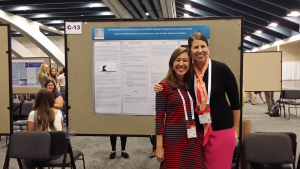Practicing Patience in Sport: The Why Becomes the How

“Therefore let us also, seeing we are compassed about with so great a cloud of witnesses, lay aside every weight, and the sin which doth so easily beset us, and let us run with patience the race that is set before us, looking unto Jesus the author and perfecter of our faith, who for the joy that was set before him endured the cross, despising shame, and hath sat down at the right hand of the throne of God.” (Hebrews 12:1-2, ASV)
What does it mean to run a race with patience? Although oxymoronic at first glance, seasoned runners quickly recognize the importance of patience in athletic training and competition, whether in recovering from an injury or pacing themselves in distance competition. The same is true for the mature Christian who recognizes spiritual life in Christ is like a marathon that involves patiently enduring suffering. Despite the recognition that patience is important for sport and faith, many people struggle to practice patience in western society. Hard work and exertion? No problem. Patient endurance of suffering? Now that is a bit more challenging.
Why is it that we struggle so much with patience? Theologian David Bailey Harned (1997) argues Western Christianity has abandoned patience as a virtue worthy of cultivation since the industrial revolution. Rather than seeing waiting and suffering as a part of life, we have come to see the necessity of patience as indicative of technological failure. Rather than recognizing bodies need rest for injuries to heal, we think that if we just had the perfect supplement, drug, or diet, we could be back on our feet instantly. Because we do not value patience very highly, we practice it only when we are left with few options—and so struggle to suffer well. The atrophy of our patience “muscle” becomes even more problematic in our spiritual lives. We all face spiritual struggles and need to wait upon God to act. So, how do we run with patience the race set before us—whether athletic or spiritual?
My colleagues and I have conducted several research studies among athletes to discover what might help an athlete to grow in patience on and off the field. Across multiple studies, we’ve found understanding why you are waiting or suffering greatly influences how well you will wait or suffer.
For example, we studied high school and college students who were training for half or full marathons to raise money for clean water in several African countries with Team World Vision. From the time training began to two months after the race finished, runners who were increasingly motivated to train for the race because of the philanthropic mission of their work or because it helped them grow spiritually also became more patient. Training alone did not build patience—it needed to be connected to a meaningful “why.”
In another study, we examined the predictors of patience versus anxiety in elite athletes (e.g., professional, NCAA D1, Olympians), specifically focusing on how athletes’ religiousness affected their sense of meaning and self-worth, which then influenced specific emotions and thoughts to facilitate or undermine patience. We found that religion can act as both a facilitator and hindrance to the development of patience. When elite athletes expressed that they experience God’s presence in a way that is integrated in their daily lives, they experienced more meaning in life, which allowed them to think about events that might evoke negative emotions (e.g., injury, losses) in ways that allowed them to be patient. For example, they found ways to be grateful for benefits or growth that might occur though suffering. Such ways of thinking allowed the athletes to suffer well—to experience negative circumstances without being inordinately upset by them.
In contrast, when elite athletes viewed God as having exceedingly high and perfectionistic standards to which they could never live up, they tended to have a sense of self-worth contingent upon their performance in competition. This fragile sense of self led to fear of failure, followed by anxiety. This pathway of perfectionism, contingency, and fear of failure undermined patience, confirming the wisdom of Hebrews 12:1-2. When we focus on “every weight, and the sin which doth so easily beset us,” we cannot run the literal or spiritual race with patience, but when we “look unto Jesus the author and perfecter of our faith,” we have a secure sense of our worth and meaning that enables us to face adversity, frustration, and obstacles with patience.
Training alone did not build patience—it needed to be connected to a meaningful “why.”
— SARAH SCHNITKER

Confirmed. Patience is a virtue, whether working with students, colleagues, or in sport. How to do it, according to Dr. Schnitker, is to remember why.
Listen to the companion podcast.


